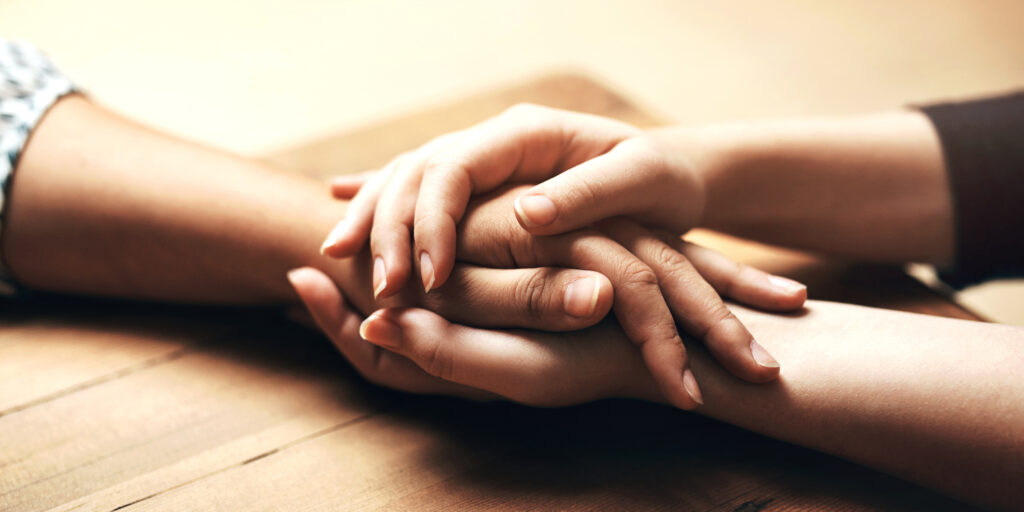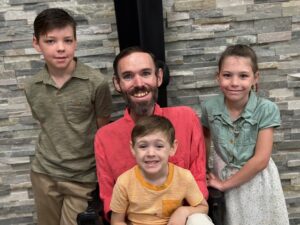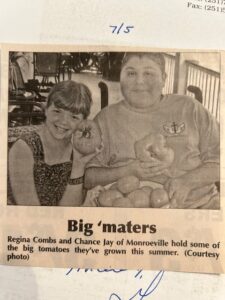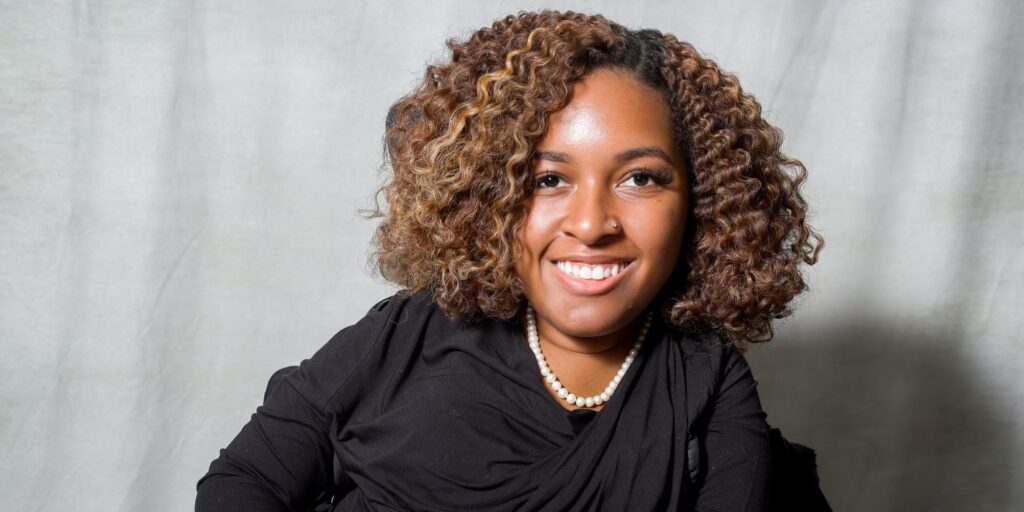
Coping with Grief After Losing a Loved One to a Neuromuscular Disease
By Claire Sykes | Thursday, July 25, 2024

Regina Lochbrunner lost her best friend to Duchenne muscular dystrophy.
Chance loved video games, fishing, and country singer Carrie Underwood. “His smile could light up any room,” says Regina Lochbrunner of her best friend, who died this year of complications caused by Duchenne muscular dystrophy (DMD). He was 28.
“Even though he knew his disease was fatal, he did everything to enjoy life,” Regina says.
Regina is doing all she can to honor him. A big part of that is letting herself grieve. It’s a natural and necessary response to the loss of a loved one. However, even though it’s natural, we all need to develop tools to cope with grief.
We each grieve differently
“Everyone’s grief journey is unique. There is no right or wrong way,” says Darla Goulet, LMSW, a clinical social worker at the MDA Care Center at the University of Michigan Health. “It’s good to let go of any preconceived ideas about what you should or shouldn’t feel and how long grieving should or shouldn’t last.”
Isaac Banks, 39, who lives with limb-girdle muscular dystrophy (LGMD), lost his two older brothers, Matt and Josh, to the same disease in 2009 and 2014, respectively.

Isaac Banks, pictured with his three children, lost his two older brothers to limb-girdle muscular dystrophy (LGMD).
Both were 34.
“I miss them so much, every day,” Isaac says. “At first, I didn’t allow myself to grieve. The terror I felt of also dying too soon took over until my doctor told me I’d be fine, and that’s when I could start healing. Grieving is the first step toward healing, and healing gets us back to hope.”
Grief is more than sadness
Grieving stirs up everything — from denial, numbness, and deep sorrow to anger, regret, and guilt. One’s relationship with the person — whether child, parent, spouse, or friend — affects those emotions. For example, “a caregiver of someone with a neuromuscular disease who has died can feel a lack of purpose,” says Darla.

Anna Goldberger lost her mother to amyotrophic lateral sclerosis (ALS).
Anna Goldberger, LCSW, is a therapist and Clinical Manager at Head/Heart Therapy in Chicago and a former neuromuscular social worker at Lurie
Children’s Hospital. Three years ago, she lost her mother to amyotrophic lateral sclerosis (ALS). “Feelings will come and go,” she says. “Our nervous system can’t handle them all at once. You’ll get breaks and feel normal, and then something totally unexpected can set them off.”
While grief is natural and necessary, feeling a combination of strong emotions without strategies to process them can negatively affect long-term mental and physical health. “All these emotions can lead to depression and anxiety, and physical symptoms, including dizziness, nausea, stomach cramps, and irregular heartbeat,” Darla says.
10 ways to cope with grief
Losing a loved one can be overwhelming. That’s why it’s important to know how to manage the emotions of grief:

Darla Goulet is an MDA Care Center social worker.
- Express your feelings. Start by accepting them. “You may not want to feel everything you’re feeling, but you do. Your emotions are here for a reason, so give them that space,” Anna says.
- Be good to yourself. Eat healthy foods, stay hydrated, exercise, get good sleep, and take breaks when you need to. “Be compassionate with yourself. Don’t expect to hold to the same level of activity as before,” Anna says.
- Be patient. There’s no need to rush grieving. “It’ll take as long as it takes,” Anna says. “Don’t let anyone tell you, ‘Hasn’t it been long enough?’ This is your process, and you don’t need to explain or defend yourself to anyone else.”
- Talk (or write) it out. Regina talks with her husband about missing Chance. “It makes me feel better,” she says. She also sometimes writes notes to Chance on her cell phone and talks to him. “I go out on the back porch and tell him every single thing,” she says. Whether it’s your porch or your diary, it helps to have a safe space to express your feelings. Anna suggests joining a support group with people who’ve gone through a similar loss.
- Share with a professional. “Choose a counselor who has experience with loss, grief, and chronic illness,” Darla suggests. Regina sees a therapist once a week and a psychologist once a month.
- Explore your creativity. “Talking doesn’t work for all feelings or situations around grief,” Anna says. “A lot of our feelings come from a deeper part of us and our bodies.” Creative activities like drawing, writing poems, playing music, dancing, or gardening may help release those feelings.
- Lean on a routine. Take up old or new activities and try to stick to a schedule. “It helps to find something to put your energy into,” Anna says. “Sometimes we need the distraction.”
- Embrace your memories. “I look at my photos and imagine the fun times we had,” Regina says. “I still have Chance’s texts on my phone and a video of him acting silly. Sometimes, I watch that to hear him laugh again.”
- Honor your loved one. You might make a quilt from their clothing, plant a tree in their name, or buy a plaque for a park bench. Shortly after Chance’s death, Regina became an MDA advocate, spreading awareness of DMD on her Facebook page and her “Doing this makes me feel better knowing his death wasn’t in vain, and it keeps his memory alive for me,” she says.
- Live your life. “You’ve got to try and keep going one day at a time,” Regina says. Isaac strives to emulate how Matt and Josh “loved well and lived life to the fullest,” he says. “I’m now able to cry for the things I miss about my brothers and appreciate the time I had with them.”

Regina treasures the memories she made with her friend Chance.
Grief over the loss of a loved one does not end, but gradually, it changes. “You’re always going to wish the person could be here. The pain will never go away. But over time, it will get lighter to carry,” Regina says.
Having the tools and support to work through your feelings can help you get to a more positive place at your own pace.
“The grief I feel now is with gratitude,” Regina says.
Next Steps and Useful Resources
- Find resources and programs to support mental health at MDA’s Mental Health Hub.
- MDA’s Mental Health Considerations for Caregivers can help family caregivers recognize burnout and find resources.
- Grief is a normal reaction to living with a progressive disease. Read about how to manage grief and find joy in life with a neuromuscular disease.
- Stay up-to-date on Quest content! Subscribe to Quest Magazine and Newsletter.
Disclaimer: No content on this site should ever be used as a substitute for direct medical advice from your doctor or other qualified clinician.




